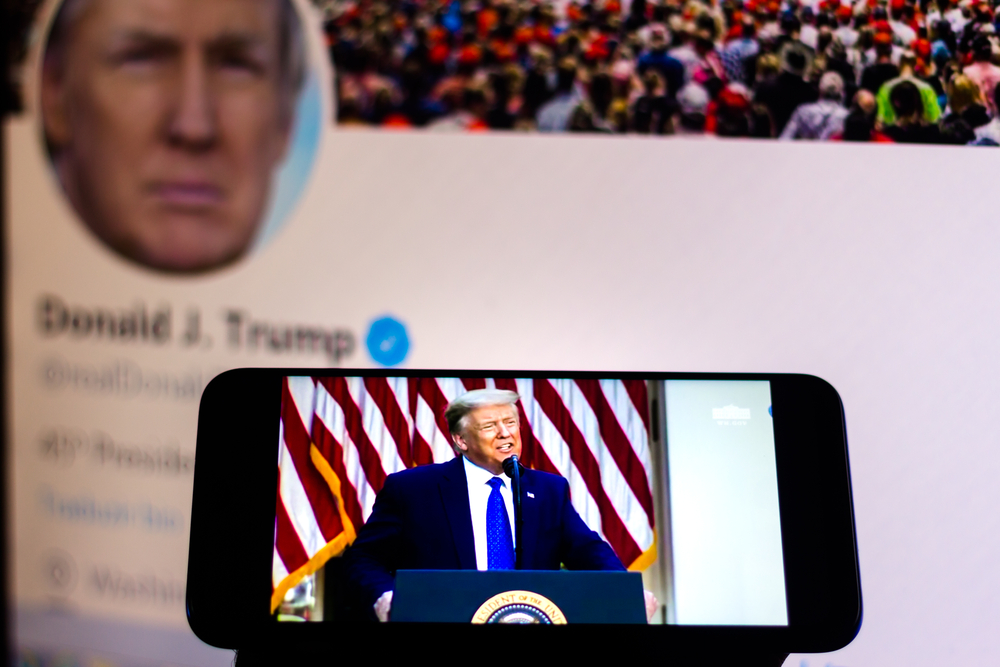Trump v. Facebook, and the Future of Free Speech

On July 7th, former President Donald Trump announced his intention to sue Facebook, Twitter, and Google for banning him from posting on their platforms. Facebook initially banned Donald Trump following the January 6th insurrection and Twitter and Google soon followed suit. Trump’s ban poses not only legal questions concerning the First Amendment, but also moral questions concerning whether or not social media companies owe a duty to guarantee free speech.
Does Trump have any moral standing when it comes to his ban from Facebook, Twitter, and Google? How can we balance the value of free expression with the rights of social media companies to regulate their platforms?
After the events of January 6th, Trump was immediately banned from social media platforms. In its initial ban, the CEO of Facebook, Mark Zuckerberg, offered a brief justification: “We believe the risks of allowing the President to continue to use our service during this period are too great.” Following Trump’s exit from office, Facebook decided to extend Trump’s ban to two years. Twitter opted for a permanent ban, and YouTube has banned him indefinitely.
Though this came as a shock to many, some argued that Trump’s ban should have come much sooner. Throughout his presidency, Trump regularly used social media to communicate with his base, at times spreading false information. While some found this communication style unpresidential, it arguably brought the Office of the President closer to the American public than ever before. Trump’s use of Twitter engaged citizens who might not have otherwise engaged with politics and even reached many who did not follow him. Though there is value in allowing the president to authentically communicate with the American people, Trump’s use of the social media space has been declared unethical by many; he consistently used these communiques to spread falsehoods, issue personal attacks, campaign, and fund-raise.
But regardless of the merits of Trump’s lawsuit, it raises important questions regarding the role that social media platforms play in modern society. The First Amendment, and its protections regarding free speech, only apply to federal government regulation of speech (and to state regulation of speech, as incorporated by the 14th Amendment). This protection has generally not extended to private businesses or individuals who are not directly funded or affiliated with the government. General forums, however, such as the internet, have been considered a “free speech zone.” While located on the internet, social media companies have not been granted a similar “free speech zone” status. The Supreme Court has acknowledged that the “vast democratic forums of the Internet” serve an important function in the exchange of views, but it has refused to extend the responsibility to protect free speech beyond state actors, or those performing traditional and exclusive government functions. The definition of state actors is nebulous, but the Supreme Court has drawn hard lines, recently holding that private entities which provide publicly accessible forums are not inherently performing state actions. Recognizing the limits of the First Amendment, Trump has attempted to bridge the gap between private and state action in his complaint, arguing that Facebook, Twitter, and Google censored his speech due to “coercive pressure from the government” and therefore their “activities amount to state action.”
Though this argument may be somewhat of a stretch legally, it is worth considering whether or not social media platforms play an important enough role in our lives to consider them responsible for providing an unregulated forum for speech. Social media has become such a persistent and necessary feature of our lives that Supreme Court Justice Clarence Thomas has argued that they should be considered “common carriers” and subject to heightened regulation in a similar manner to planes, telephones, and other public accommodations. And perhaps Justice Thomas has a point. About 70% of Americans hold an active social media account and more than half of Americans rely upon social media for news. With an increasing percentage of society not only using social media, but relying upon it, perhaps social media companies would be better treated as providers of public accommodations rather than private corporations with the right to act as gatekeepers to their services.
Despite American’s growing dependence on social media, some have argued that viewing social media as a public service is ill-advised. In an article in the National Review, Jessica Melugin argues that there is not a strong legal nor practical basis for considering social media entities as common carriers. First, Melugin argues that exclusion is central to the business model of social media companies, who generate their revenue from choosing which advertisements to feature to generate revenue. Second, forcing social media companies to allow any and all speech to be published on their platforms may be more akin to compelling speech rather than preventing its suppression. Lastly, social media companies, unlike other common carriers, face consistent market competition. Though Facebook, Instagram, and Twitter appear to have taken over for now, companies such as Snapchat and TikTok represent growing and consistent competition.
Another consideration which weighs against applying First Amendment duties to social media companies is the widespread danger of propaganda and misinformation made possible by their algorithmic approach to boosting content. Any person can post information, whether true or false, which has the potential to reach millions of people. Though an increasing amount of Americans rely on social media for news, studies have found that those who do so tend to be less informed and more exposed to conspiracies. Extremists have also found a safe-haven on social media platforms to connect and plan terrorist acts. With these considerations in mind, allowing social media companies to limit the content on their platforms may be justified in combating the harmful tendencies of an ill-informed and conspiracy-laden public and perhaps even in preventing violent attacks.
Despite the pertinent moral questions posed by Trump’s lawsuit, he is likely to lose. Legal experts have argued that Trump’s suit “has almost no chance of success.” However, the legal standing of Trump’s claims do not necessarily dictate their morality, which is equally worthy of consideration. Though Trump’s lawsuit may fail, the role that social media companies play in the regulation of speech and information will only continue to grow.




